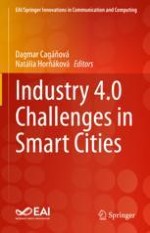2023 | OriginalPaper | Buchkapitel
Closed Cycle of Biodegradable Wastes in Smart Cities
verfasst von : Michal Holubčík, Jozef Jandačka, Juraj Trnka
Erschienen in: Industry 4.0 Challenges in Smart Cities
Aktivieren Sie unsere intelligente Suche, um passende Fachinhalte oder Patente zu finden.
Wählen Sie Textabschnitte aus um mit Künstlicher Intelligenz passenden Patente zu finden. powered by
Markieren Sie Textabschnitte, um KI-gestützt weitere passende Inhalte zu finden. powered by
